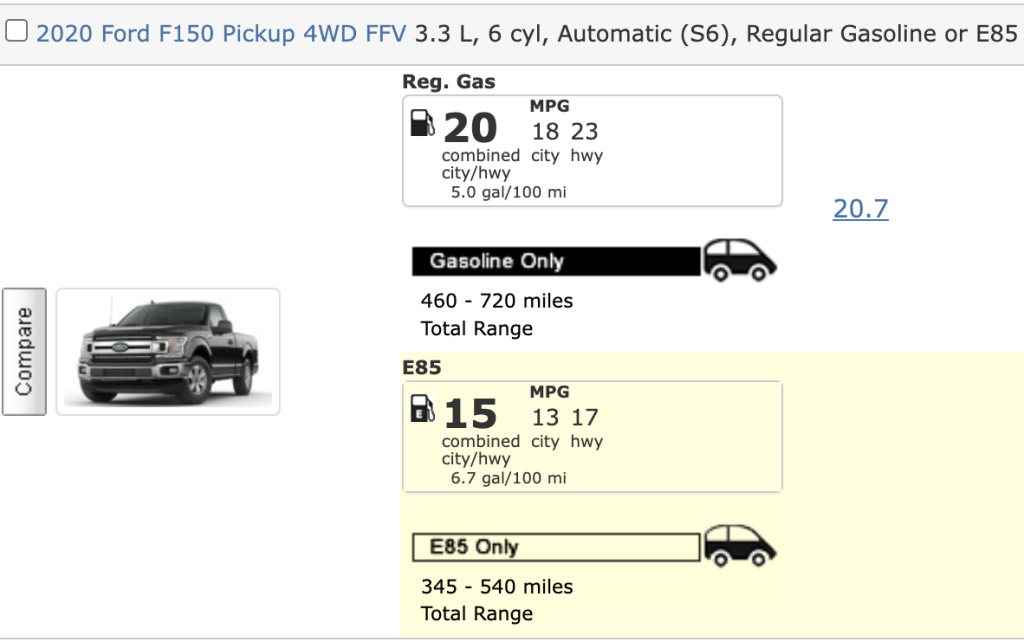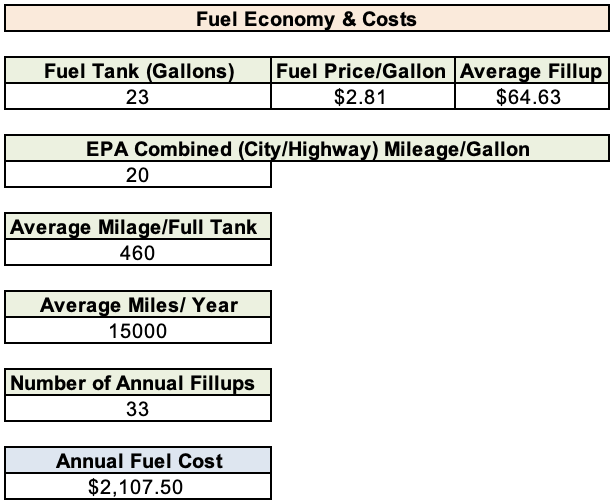Maintenance. By changing your vehicle’s motor oil and following the manufacturer’s scheduled maintenance you can maintain and improve your car’s fuel economy.
EPA Fuel Economy

The EPA estimates for the fuel economy of a new vehicle can be different from one driver to another based on driving conditions, driving style, and vehicle maintenance. Driving conditions include things out of our control, such as stop and go traffic, extreme hot or cold weather or even road conditions. A driver’s style may involve driving in sport mode, abrupt acceleration or braking, or driving to the posted speed limit. This post will focus on the one variable we can influence – oil changes. We’ll discuss the impact of consistent oil changes on fuel economy by maintaining the engine’s health.

As an example, we will talk about America’s #1 selling vehicle, the Ford F-Series pickup. A 2020 Ford F-150 4WD (3.3L V6 w/23 Gallon Fuel Tank) from the factory would have had an anticipated combined city and highway mileage of 20 MPG. . This vehicle averaging 15,000 miles annually, would require approximately 33 fill-ups over the course of a year . The annual estimated fuel cost can vary significantly depending on where you live. In this example, assume this driver lives in Dallas, Texas and pays an average of $2.81/gallon. Her annual cost of fuel would be $2,250. During that same 15000 miles, this driver drove under Normal driving conditions. As defined in the 2020 F-150’s owner manual, Normal driving is:
- Normal commuting with highway driving
- No, or moderate, load or towing
- Flat to moderately hilly roads
- No extended idling
Oil Changes
Let’s assume the OIL CHANGE REQUIRED comes on every 7,500 miles or twice a year. This vehicle will require two oil and filter changes.
During the 7500 miles of driving between oil changes, the motor oil is essential in helping the engine perform to factory standards. While driving, motor oil lubricates the engine’s metal parts, helping them move smoothly and reduce friction. Reducing friction is critical in ensuring the engine’s metal parts that come in contact have as little resistance as possible. Secondly, motor oil helps remove contaminants that are a byproduct of the combustion cycle. If the contaminants build up beyond the capacity of the motor oil to absorb them, they can leave deposits, sludge and ultimately wear out the metal components.
The buildup of contaminants and wearing out of metal components over time will result in the engine performing less than optimal and, as a result, begin to decrease the efficiency of the engine, which will directly impact the fuel efficiency. The fuel provides the energy for the combustion cycle, which then provides the power for the engine. The harder the engine works, the more fuel it needs!

What Oil to Use
In the vehicle owner’s manual, the manufacturer will have a recommended motor oil to use, and at a minimum, this is the standard that should be followed. The oil will either be a conventional, synthetic blend or full synthetic. To have the most significant impact on fuel efficiency, I would recommended to use a full synthetic engine oil. In the case of the 3.3L V6 Ford F-150 it recommends the use of a conventional SAE 5W30 motor oil. My recommendation is to use a full synthetic SAE 5W30 motor oil. Synthetic oil is the most refined form of motor oil you can use which means it has far less impurities and has been engineered to protect your engine better than conventional and synthetic blends. Just a few brands of synthetic motor oils to consider include: Castrol, Mobil1, Pennzoil, Valvoline and Amsoil.
Benefits of Synthetic Oil
The following are the benefits of using synthetic oil:
1) Oxidation Stability
Since they are more pure products regarding their composition, synthetic oils are more stable and durable than mineral oils. This becomes even more important in extreme temperatures or applications.
Compared to mineral oils, synthetic fluids remain stable when exposed to low and high temperatures, water, fuel contamination, acids, and other combustion byproducts in engines. Synthetic oils also have a non-hydrolytic property which means they do not emulsify in damp conditions (turn to sludge). Increased oil oxidation means increased engine performance.
2) Higher Viscosity Index
A higher viscosity index indicates that synthetic oil is more resistant to temperature changes. This means the oil will flow well in cold weather, and the oil will not thin out in high temperatures. The oil forms a protective film on metal parts and provides higher protection against engine wear.
3) Long Service Life
In general, synthetic oil and lubricants have a much longer service life than conventional and synthetic blend oils meaning they require less frequent oil changes. These extended drain intervals impact a part of the maintenance costs, one of the points that justify the higher price of synthetic oil.
4) Better Energy Efficiency
Another benefit of synthetic oil, which comes from its higher traction coefficient, is better energy efficiency. The traction coefficient means the power needed to move heavy loads decreases when synthetic oils are used.
To maintain the factory efficiency of the engine, changing the oil at the recommended interval benefits the engine by protecting the metal components, removing contaminants from building up and utilizing a full synthetic provides the added benefits of oxidation stability, improved viscosity, longer service life which all results in improved engine efficiency.
Oil Filter
The oil filter is often the overlooked component of an oil change. Motor oil is circulated through the engine, and the majority of the oil is stored in the oil pan. Before it circulates back through the engine, an oil pump pulls the motor oil and sends it through the oil filter. As the motor oil flows through the filter, it travels through pleated folds or media, and impurities such as dirt, sludge and metal particles are filtered out before being returned to the engine for use. This filter filters the motor oil and removes contaminants before they can be recirculated through the engine.
If you think about motor oil as removing contaminants that are a byproduct of the combustion cycle, then think of the oil filter as where these byproducts will be trapped until the oil is changed. When it comes to an oil filter, like motor oil, it’s important to recognize there are conventional filters and premium filters. A filter is essentially layers of specially formulated media the oil passes through, and ultimately, contaminants are trapped in the media layers.
Oil Change Parts Costs
Over the course of driving 7500 miles, the filter will have accumulated trapped contaminants which will be disposed of by installing a new oil filter. However, not all oil filters are created equally. Some will have more layers of media filtration, and the level of filtration will be measured at the micron level. Buy a premium oil filter that offers more layers of filtration and has the lowest number of microns being screened.

Conclusion
At a minimum, changing the engine oil based on the manufacturer’s recommendation using the specified motor oil and filter will be vital in maintaining the longevity and efficiency of the engine, which is directly related to fuel economy. However, using premium products like full synthetic oils and premium oil filters will add to these products’ performance, resulting in sustained peak fuel efficiency for years to come. If you haven’t already, take a look at your owner’s manual to determine what the frequency of oil change services are for your vehicle and what your manufacturer deems as Normal driving.





